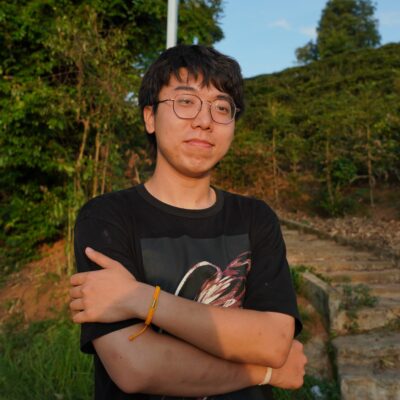Student Spotlight: Zhuang Han

April 28, 2025
Zhuang Han is a doctoral candidate in development studies from Datong, Shanxi, China and Ann Arbor, Michigan. He earned his B.S. in sociology and computer science with high honor from the University of Michigan and M.S. in development studies from Cornell and now studies the life choices of a group of Chinese youth known as “Sanhe Gods” under the guidance of Parfait Eloundou-Enyegue, Sarah Giroux, and Eli Friedman at Cornell.
What is your area of research and why is it important?
My research specifically explores the life choices of a group of lower-class young people known as the “Sanhe Gods”—individuals who voluntarily choose a jobless, penniless, and homeless lifestyle despite the availability of stable factory jobs. By linking their experiences with theories of systemic social inequality and individual agency from both the Chinese and the international context, I explore the concerns of grassroots Chinese youth and examine their resistance against exploitative working systems and cultures.
What are the larger implications of this research?
China represents an important case of drastic demographic and labor market transformations. A rapidly aging population, declining marriage and birth rates, a growing mismatch between education curricula and labor market needs, and the rise of app-based gig economies combine to create a highly precarious labor market for low-skilled, working-age youth, particularly those from marginalized backgrounds. My research seeks to capture and interpret the nature and depth of the common concerns of Chinese youth during this profound structural transformation at both the national and international level. I investigate how individuals adopt, challenge, and reshape the processes of social change through innovative life experiments and practices.
What does it mean to you to be a Bouchet Scholar?
Character, leadership, advocacy, scholarship, and service are the core values of a Bouchet Scholar. As an individual, I feel empowered by these principles, which also reflect the spirit of Cornell’s founding principle: “Any person, any study.” Within this network, a marginalized background is recognized as a vital source of lived experience and knowledge—capable of shaping transformative pathways toward a future grounded in prosperity and social justice. I look forward to developing more collaborative projects that engage students and scholars from marginalized communities through this scholarly network.
How do you exemplify the five pillars of the Bouchet Society—character, leadership, advocacy, scholarship, and service?
Extreme poverty and systemic social inequality are violations of human rights. I envision a world free from extreme poverty, where people’s basic needs for food, clean water, shelter, security, health, and education are guaranteed as fundamental human rights. This vision motivates my commitment to research that helps society understand the social, economic, political, and environmental causes of extreme poverty and systemic social inequality. As a demographer and sociologist, I believe that character, leadership, advocacy, scholarship, and service are the core qualities needed to develop practical research projects and effective solutions to these deeply rooted social problems.
What are your hobbies or interests outside of your research or scholarship?
I share my apartment with my cat, Oreo, who has been my greatest source of emotional support during my time at Cornell. I’m also a big coffee drinker with a particular love for drip coffee. As the grandson of small-scale farmers, I see coffee not just as nourishment, but as a meaningful connection between people and the land. I enjoy learning the history and stories behind every bag of beans I purchase. I also consider myself a world traveler—there’s nothing more fulfilling than venturing beyond the familiar and making friends in new places.
Why did you choose Cornell to pursue your degree?
Cornell—and my home department, global development—is a place that values and actively supports interdisciplinary study. What drew me as both a student and a social science scholar is the commitment to centering real-world social problems, rather than disciplinary boundaries, in the design of research projects. I believe the future of innovation lies in the integration of diverse forms of knowledge and perspectives across disciplines.
